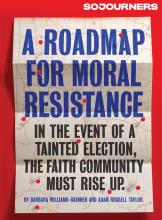PEOPLE OFFER MANY reasons for not voting, from “one vote doesn’t matter” and “there’s no real difference between the parties” to the conviction that an election “won’t bring about real justice (or the reign of God).”
The latter, at least, is certainly true. Voting—even electing the best-available candidates for the most important positions in government—definitely won’t bring about the peaceable kingdom.
But who is ultimately elected—especially at the presidential level—can make a world of difference in the lives of those in the most vulnerable conditions. For instance, in the past three-plus years, more than 200 judges have been appointed to the bench, many of them to lifetime terms. Of that number, zero have been Black. And judicial appointment is only one of many powers in executive hands, which affect everything from education, housing, and immigration policies to whether our society makes the hard choices of confronting racialized policing and combating climate change.
Read the Full Article

